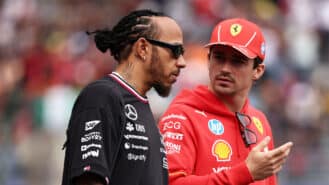
Verstappen proves Russell right: Abu Dhabi GP 2024 – Up/Down
Verstappen's prang at the first corner of the F1 finale in Abu Dhabi vindicated George Russell's recent rant
A series taken from the 164-page Motor Sport special Great Racing Cars, which is available to buy here
From the editor Damien Smith
How would you define a ‘great’ racing car? Race wins and championship titles are an obvious place to start – and admittedly, when we began the process of rounding up the ‘voices’ to fill this special magazine, published by the team behind Motor Sport, we had in mind the likes of the Lotus 72, Ferrari F2004, Porsche 917, Audi R10 and so on.
But as the interviews of familiar racing figures began, we realised greatness is often a very personal thing. Naturally, most – but not all – would pick cars they had experienced first-hand, as a driver, designer, engineer or team boss. And on occasion the cars that stood out in their minds as ‘great’ weren’t necessarily so in the grand scheme of history. That’s why you’ll find a Minardi here among Formula 1 cars from Lotus, Williams and McLaren.
Unexpected? Certainly. Wrong? Not to the man who chose it.
As the interviews accumulated, our magazine took on a life of its own, full of personal anecdotes about the myriad cars that made careers. Some of those we spoke to, such as Mario Andretti and Dan Gurney, couldn’t be tied to a single choice from multi-faceted lives at the wheel. Such heroes have earned the right to choose an F1, sports and Indycar, so we allowed them more than one bite.
Others refused to be confined by category. Hence the short ‘Odd ’n Sods’ chapter on cars that, by and large, are mere footnotes in lower divisions of racing lore.
Thus there is nothing definitive about the selection listed herein. Then again, there’s no claim that this compilation offers the ‘Greatest Racing Cars’ of history. It’s much more personal than that, much more quirky – and all the better for it.
2001-03 Bentley Speed 8
Guy Smith
2003 Le Mans 24 Hours winner
It’s a tough one, between the Van Diemen RF95 in which I won the British Formula Renault title and the Bentley Speed 8 in which I won Le Mans in 2003.
I’ve gone for the Bentley because even now it just feels so comfortable, and always puts a smile on my face.
I was closely involved in the development of the Speed 8 as Bentley’s test driver and racing reserve. We’d had a fast car in 2001, but it wasn’t an endurance car because it was hard work to drive and the driveability of the engine really wasn’t as good as we wanted it to be. So we focused on making the 2003 car not only fast but also easier to drive and more user-friendly for the whole team.
Throughout the 2002 season, and the early part of 2003, we worked tirelessly, putting thousands of miles on the car to make it better than its predecessor in every area. From the very first test it was obvious to me that the Speed 8 was a different animal – it felt like a car you could jump in and drive to the shops. It was so easy to drive, the engine now so smooth and progressive. Once we got out on the track it was instantly quick, easily faster than the 2001 car, and more importantly it was consistent and reliable.
We knew we had a car that could win at Le Mans and victory in June was a dream come true.
What made it more special for me was that I had so much input into all areas of that car and it doesn’t get any better than winning at Le Mans. It’s a shame that the Speed 8 didn’t do more races. It’s a beautiful racing car and people still tell me it’s their favourite prototype.
It’s certainly mine.
An Audi with a roof? Put a lid on it…
Why Bentley’s Le Mans winner was a genuine British car, despite the long-held rumours. By Andrew Frankel
Unalloyed triumphs are rare events. With almost every victory comes a tinge of regret, a sense not just of a job well done, but ways in which it could have been done even better. Bentley’s successful three-year campaign to win the Le Mans 24 Hours at the start of this century is the perfect case in point.
The history books show that at its first attempt, Team Bentley placed third in 2001, a podium position behind two realistically unstoppable works Audi R8s. In 2002 with just one car entered, it came fourth and once more first car home behind the factory R8s. In 2003 with only private R8s to contend with, two Bentleys entered, placing first and second. In all three attempts, amounting to well over 100 hours of racing, one car retired due to freak weather conditions, but none was ever pushed back into the pit garage for repairs. Indeed the winning Speed 8 in 2003 spent a grand total of 17 unscheduled seconds in the pits, an unparalleled achievement in the history of the race. Who could want for more?
Entrant: Bentley
Notable drivers: Tom Kristensen, Rinaldo Capello, Guy Smith, Johnny Herbert, Mark Blundell, David Brabham, Martin Brundle, Andy Wallace
Debut: 2001 Le Mans 24 Hours
Achievements: 1 win, 1 pole
Constructors’ Championships: 0
Drivers’ Championships: 0
The source of dissatisfaction is two-fold, neither being the obvious fact that Bentley didn’t win every Le Mans it entered. I was in the team’s pit for the duration of all three races and not once was there any sense that the team was punching below its weight. Indeed most of the time they exceeded every expectation. I know, for instance, that the never-communicated internal goal for 2001 was for one car to get home in the top 10.
A podium was unimaginable. No, what still rankles in certain Bentley circles to this day is that the perception still exists that the EXP Speed 8 (or Speed 8 as the 2003 car was known) was actually an Audi R8 with a roof.
On suggestions that the Speed 8 was an R8 coupé, genuine bafflement exists even today. “I guess we just didn’t do that great a job communicating it at the time,” says Bentley’s engineering guru Brian Gush, who was instrumental in the entire project from its earliest days and, with Tony Gott, probably campaigned harder and for longer than anyone to get Bentley to La Sarthe. Brian’s killer fact is that there was more British content in the Audi than there was German content in the Bentley. “But people saw that we used an Audi engine, knew we both belonged to the same group and came to some entirely wrong conclusions.”
A man with an even greater right to be cheesed off with this perception is Peter Elleray, who designed both the 2001-02 EXP Speed 8 and all-conquering 2003 Speed 8.
“It’s just sheer bloody ignorance,” he says. “It’s true the R8C was designed at RTN,” he adds, referring to the Audi coupé that proved completely inadequate at Le Mans in 1999 and Racing Technology Norfolk, the factory where the racing Bentleys were created.
“So yes, we had that knowledge. But engine aside, there was not a single thing on the Bentley that had anything to do with the R8C or, indeed, any other Audi.”
Taken from the April 2012 issue of Motor Sport. To read more click here.

Verstappen's prang at the first corner of the F1 finale in Abu Dhabi vindicated George Russell's recent rant

FIA president Mohammed Ben Sulayem seemed intent on making F1 a united front by the end of the 2024 Qatar GP – against him

Leclerc erupted after feeling wronged one time too many by Sainz in Vegas – but the challenge posed by his team-mate next year, Lewis Hamilton, will be much greater writes James Elson

2024 has been Max Verstappen's masterclass – it should go down in history as one of F1's greatest titles